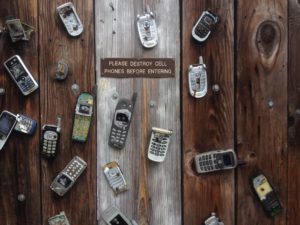You hear it. You feel it. You hear and feel it.
The vibration in your pocket, the ding in your purse, the rattling on the counter…. your phone erupts and your mind is gone.
It may just be for a second, but often that second commandeers more.
You start to wonder why your phone spit out a notification alert. It’s most likely unimportant, but what if a family member is calling from a burning building? Or your pet dog is being held for ransom? Or someone just posted an opinion on social media that has a slightly different twist than the other 73 articles you read?
I Know from Experience
It’s amazing how the potential for the extreme can slip into my mind. Something meant to “keep me in the know” is “keeping me out of the now.” My mind has been officially distracted from my present setting.
 While this is mostly a self-indictment of my own struggle with constant distraction, studies show I am not alone.
While this is mostly a self-indictment of my own struggle with constant distraction, studies show I am not alone.
I know I’m not strong enough to ignore the proverbial knocks on my electronic door, so
I need to separate myself from my phone to be fully present with my wife and kids. The buzz is too alluring. Sure, I can muscle superhuman restraint and feign a “what notification?” look, but as soon as the eyes dart away, my attention darts down.
Turn off the notifications? Great idea! Except those dings and buzzes have brainwashed my curiosity into seeking an endless flow of information. Generations of people survived without this 24/7 connectedness. Can I?
I find myself drawn to my phone during any dull moment, even without an alert. How much time has passed since the last time I knew the exact time? How cold will it be next Wednesday? I wonder if somebody posted a picture without any context that could make me question my joy or friendships? Why did I just refresh my email that was updated 3 minutes ago? Wait, how old are the Hanson brothers?
I have access to so much, but I’m rarely a better person after I’ve digested new content.
What are We Missing?
Distraction takes us out of conversations. It prevents us from noticing the beauty hiding right in front of us. It hijacks the free moment, impairing our ability to hear invitations, sense subtle nudges, and dream of what could be. It hinders our pursuit of becoming all that God has created us to be.
Whether our distraction is rooted in fears of boredom or being alone with our thoughts, or our default settings have slowly been rewired through unseen inertia, we have to figure out a path forward.
I’m not condemning technology. It opens up possibilities and produces efficiency that were never before imagined. But we must be aware of how the hardware is impacting our own internal software.
 We Need to be Proactive
We Need to be Proactive
What will it take for you to be in control? To create space to mull over the vital and non-urgent matters? To protect meaningful conversations and moments with those you love? To be aware of your surroundings and present to invitations that God may stir up? What boundaries must you establish?
I need to separate myself from my phone. To turn it off or put it somewhere beyond the manipulative grasp of notifications. To treat myself like a child.
I need to fire my phone as my alarm clock. The shiny apps are too tempting in themfirst and last moments of every day.
I need to delete apps, create roadblocks, and establish consequences in order to break habits.
In other words, embrace weakness.
Then, in that awkward space, I need to courageously face the feeling of inefficiency and boredom. And trust God to meet me there and re-create a new sense of comfortability.
What is our goal?
God desires a relationship with us. He wants to conform us to His image for our own joy and for the sake of others. He is ready to partner with us to discover the freedom, peace, and fulfillment only found in Him.
This happens when we are attentive to His voice. When white noise dies down enough to hear His invitations and see His work around us. We need to create space for God to work.
It starts with addressing the distracting elephant in the room.
